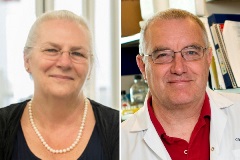Four new pan-Canadian research teams join the Team Canada of Cancer Research

The Marathon of Hope Cancer Centres Network is excited to announce that four new research teams will be receiving funding through its Pan-Canadian Projects program, which unites researchers and clinicians from multiple provinces to work on projects that accelerate precision medicine for cancer in Canada.
The teams will focus on improving outcomes for patients with aggressive forms of lung, oral, brain and prostate cancers. Each project lasts three years. In their first year, the groups will receive a total of $819,000 from the Network, with additional funds from partner institutions adding up to a total investment of $3,113,918. Further funding will be determined based on the number of cases that each group is able to contribute to the MOHCCN Gold Cohort.
“Building new collaborations amongst Canadian cancer experts is the only way to accelerate the implementation of precision oncology in Canada, so that one day every cancer patient in this country can receive the right treatment at the right time for their particular cancer,” says Dr. André Veillette, executive director of the MOHCCN. “The four projects we are announcing today not only help build these collaborations but will also help move the needle on very aggressive cancers, bringing much-needed hope to patients.”
The first project forms a new pan-Canadian team of experts focused on Head and Neck Cancers, who will come together to understand the molecular underpinnings of high recurrence rates in oral squamous cell carcinoma to improve survival and quality of life for patients. The team will be led by Dr. Pinaki Bose (University of Calgary) and includes experts from five institutions in Alberta, Quebec and Ontario.
The second project, led by Drs. Jennifer Chan (University of Calgary) and Marshall Pitz (CancerCare Manitoba), will seek to find better ways to treat patients with low grade gliomas, a deadly form of brain cancer. The group, which includes experts from Alberta, Manitoba, British Columbia, Nova Scotia and New Brunswick, will perform molecular profiling of paired initial and recurrent tumours from the same patient. This will allow them to compare the biological characteristics of tumour cells before and after treatment to find ways to better treat these tumours after they recur.
The third project, led by Dr. Jonathan Spicer (Research Institute of the McGill University Health Centre) unites experts from Québec, Ontario, British Columbia, Manitoba and Nova Scotia, who are coming together to understand why some patients with resectable lung cancers respond so well to a new treatment that combines immunotherapy with chemotherapy before surgery, while others do not. Their goal is to find ways to predict which patients are most likely to benefit from these new precision treatments and how best to treat those who do not.
Finally, the fourth project will deploy a multi-pronged approach to better understand why some prostate cancer patients respond to treatment and others don’t, with the goal of developing tests that predict who is at a greater risk of suffering from disease progression and create interventions to stop this from occurring. It is led by Drs. Armen Aprikian and Simone Chevalier (RI-MUHC, McGill University), Frédéric Pouliot (CHU de Québec - Université Laval) and Fred Saad (CHUM - Université de Montréal).
Today’s announcement raises the number of announced projects funded through this program to 12. In total, the Network will fund 20 such groups, representing a multi-million-dollar investment over the next three years that will contribute roughly 6,000 cases to the MOHCCN Gold Cohort, the largest and most complete cancer case resource in Canada. Remaining projects will be announced over the next few months as Network agreements are signed.
The four projects we are announcing today not only help build these collaborations but will also help move the needle on very aggressive cancers, bringing much-needed hope to patients.”
Related Team Members
-
Fred
Project Leader
Saad -
Marshall
Project LeaderWorking Group Member
Pitz -
Jennifer
MOHCCN Steering CommitteeConsortium LeaderProject LeaderWorking Group MemberResearcher
Chan -
Jonathan
Project Leader
Spicer -
Armen
Project Leader
Aprikian -
Simone
Project Leader
Chevalier -
Pinaki
ResearcherProject Leader
Bose -
Frédéric
Project Leader
Pouliot
Projects
-

Neoadjuvant precision therapy for non-small cell lung cancer: A platform for discovery
Tracking immunotherapy response to personalize treatment for lung cancer patients -

Canadian Head And Neck cancer GEnomic (CHANGE) Collaborative
Understanding the molecular underpinnings of high recurrence rates in oral squamous cell carcinoma to improve survival and quality of life for patients
-
Regional Consortia
Pan-Canadian Projects
- Canada Wide
Building on work done by Regional Consortia across the country, the Pan-Canadian Projects program unites researchers and clinicians from multiple provinces to work on projects that accelerate precisio...Read more
Related News
-

An incredible milestone! A letter from Dr. André Veillette
Today, we’re proud to announce that we’ve reached our initial goal of sequencing 15,000 cancer genomes. -

Marathon of Hope Cancer Centres Network launches its 2026 Health Informatics & Data Science Award competition
The Marathon of Hope Cancer Centres Network is excited to announce the launch of its 2026 funding competition for early career health informaticians and data scientists. -

Marathon of Hope Cancer Centres Network achieves goal of sequencing 15,000 genomes for game-changing cancer dataset
The Marathon of Hope Cancer Centres Network (MOHCCN), a pan-Canadian initiative led by the Terry Fox Research Institute and the Terry Fox Foundation, today announced that it had achieved its goal of s... -

Long-time Terry Fox-funded researchers, leaders and mentors Drs. Anne-Marie Mes-Masson and John Bell appointed to the Order of Canada
Drs. Anne-Marie Mes-Masson and John Bell, two distinguished researchers with deep and long-time connections to the Terry Fox Research Institute, have been appointed to the Order of Canada, one of the ...
